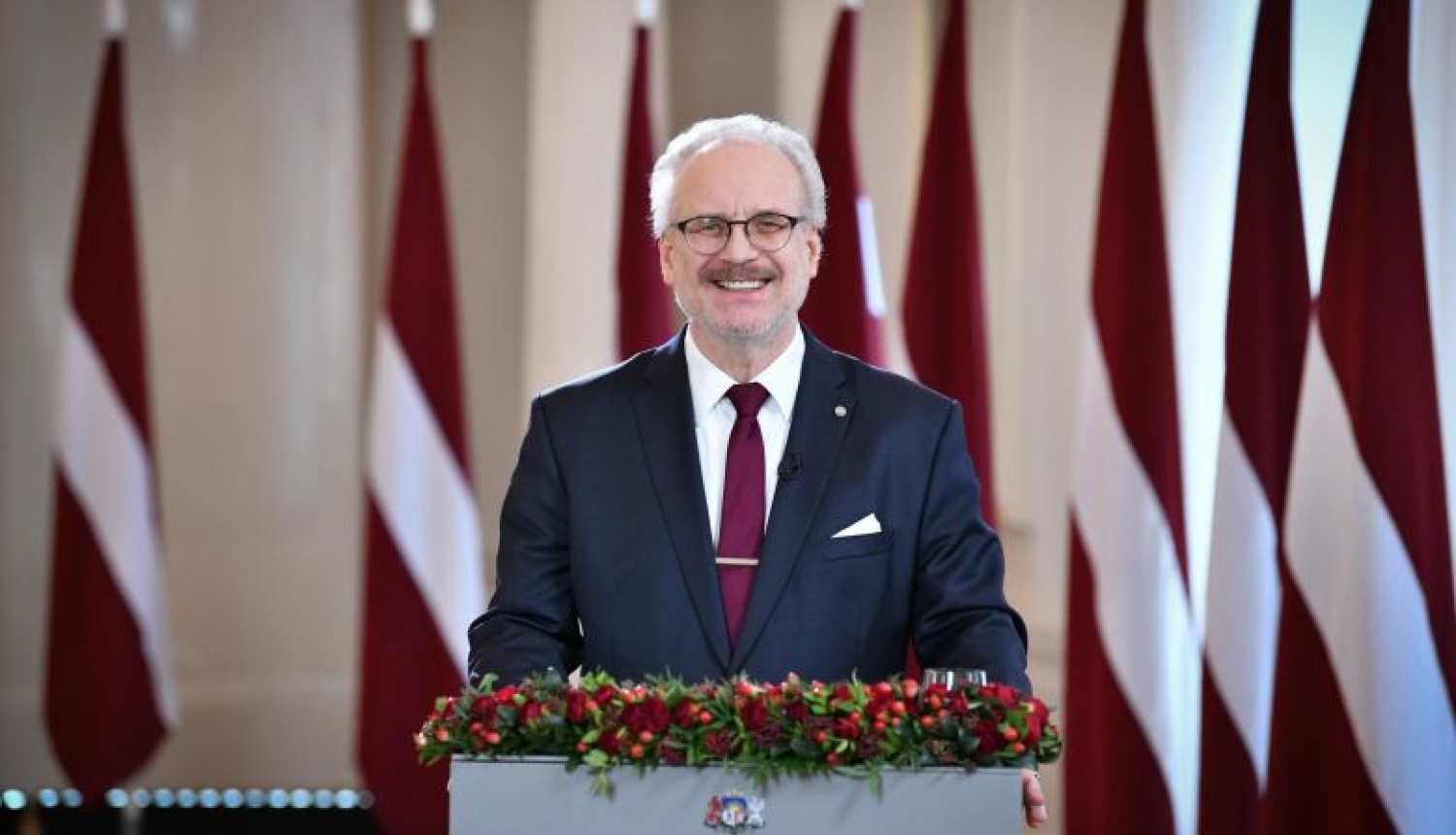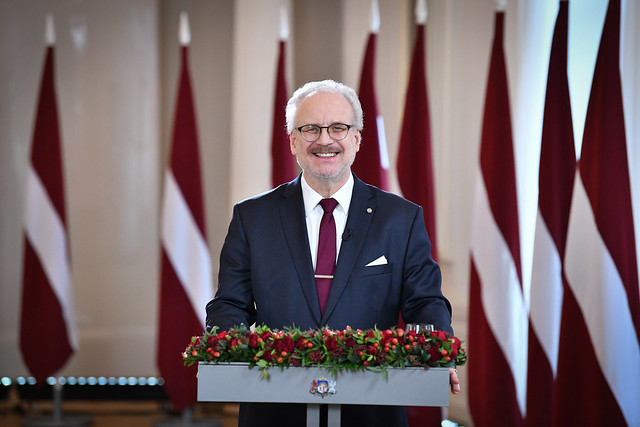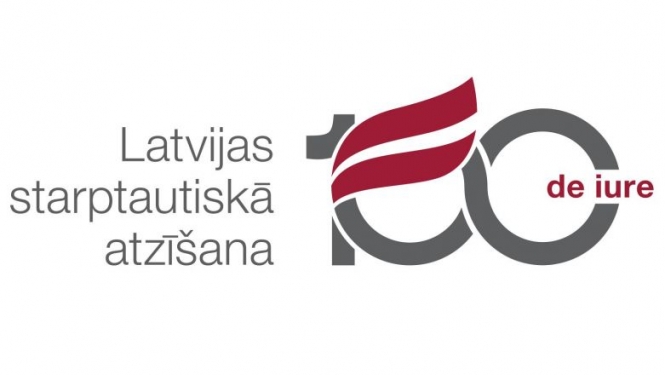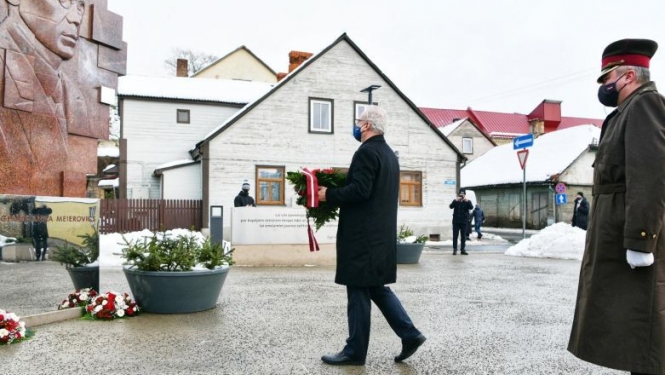
Excellencies,
Ladies and gentlemen,
Fellow Latvians,
Dear compatriots and friends of Latvia,
I
Tonight, at 6 PM, churches across Latvia will ring their bells in honour of de iure recognition of Latvia by Allies a hundred years ago in Paris on this day. The news reached Riga only the next day, when it was already known that Finland, too, had granted its recognition.
De iure recognition of Latvia by international community was the last step in the formation and establishing of the Latvian State hundred years ago, a fact that we have widely celebrated.
It all began on 2 December 1917, when the Latvian Provisional National Council announced its plans to unite Latvia into a new, sovereign state. In the constitutional sense the independent state of Latvia was proclaimed a year later, on 18 November 1918. This is the day when we officially celebrate the founding of the Republic of Latvia. Latvia proclaimed its independence as soon as it was possible, one week after the end of World War I.
However, like many new states, Latvia had to arm itself to defend its freedom. Many lost their lives defending their state against Soviet Russia and other aggressors during the two-year War of Independence. To them we are thankful for our state. Following victory in the War of Independence, on 11 August 1920 Latvia signed a Peace Treaty with Soviet Russia by which it recognised for all time the independence of Latvia.
This is the time when the Latvian nation fought for and won its own state while also solidifying its independence, democracy and rule of law, despite the hardships of war.
By establishing the Republic of Latvia and winning the War of Independence, with the following signing of Latvian-Soviet Peace Treaty, the founders and army of independent Latvia created a path for diplomats to finalise the independence of Latvia with international recognition de iure.
Latvia thereby became a permanent, full-fledged and equal member of the world community governed by international law.
II
The road to de iure recognition was not easy or short. It took a lot of hard work and dedication. On this road we came to know the pragmatism of great powers and the rules of Realpolitik.
The historic decision of 26 January was achieved by Zigfrīds Anna Meierovics, the Foreign Minister of Latvia at the time and fellow Latvian diplomats at the Paris Peace Conference and in other European capitals, notably London.
III
In those days the Latvian nation was eagerly waiting for the international recognition de iure of the Latvian State, all too aware of its historic significance. Even a hundred years later, the photos taken by the exceptional photographers Vilis Rīdzenieks and Mārtiņš Lapiņš, still convey the feelings of joy and genuine excitement back then.
Already on the next day, 27 January, the streets of Riga saw manifestations. Crowds sang the national anthem and a procession passed the embassies of countries that had granted Latvia de iure recognition, ending up right here by Riga Castle.
To this day, a hundred years later, we are still grateful to France, the United Kingdom, Italy, Belgium, Japan, and also Finland and Poland, for being the first countries to recognise Latvia de iure. They were soon followed by Germany, Sweden, Norway, Denmark and other countries.
IV
Unfortunately, less than two decades later our national independence was trampled by the Soviet occupation regime, which ruled for nearly five decades, except for three years when Nazi Germany occupied Latvia. Both occupation regimes left deep scars on the Latvian land and its people. The wounds are still not fully healed.
But our state never ceased to exist de iure. It continued to exist as a subject of international law during the occupation, because a large part of the international community continued to acknowledge the continued existence of the Latvian State, though temporarily occupied.
Many other European countries, which were occupied at the same time as Latvia at the outset of the World War II in 1939–1941, were in a similar situation from a legal point of view. They, too, never ceased to exist as independent states.
While other countries that were occupied during the war quickly restored their independence after expelling the occupation forces in 1944 or1945, the three Baltic states remained occupied up until 1990/1991.
V
Military occupation of another country is a grave international crime. Countries that recognise the supremacy of international law cannot legitimise such crimes. The doctrine of non-recognition of unlawful occupation of the Baltic states began in the USA. We have just marked 80 years since the 23 July 1940 Declaration condemning the occupation by the Soviet Union of the three Baltic states of Estonia, Latvia and Lithuania, issued by Sumner Welles, the United States' acting Secretary of State at the time. Many other countries, including France, the United Kingdom, Germany, Italy, Belgium, Canada and Japan also refused to recognise the occupation of the Baltic countries.
The Latvian State continued its de iure existence under international law throughout the occupation period. The internationally recognised diplomatic service of Latvia continued to represent Latvia on the international arena throughout these 50 years of occupation as a sign of continuity of the Latvian State.
VI
Thanks to the widespread non-violent resistance movements in Estonia, Latvia and Lithuania, the Baltic states broke free from Soviet occupation and restored independence in 1990/1991.
The persistence of the Baltic countries in their fight for freedom became one of the key factors that led to the collapse of the Soviet Union a few months later, bringing a new political order to Europe and the world. Thus, Latvians have made a historic contribution to the victory of democracy over dictatorship not only in Latvia, but also Europe and the world.
VII
Our historical experience strengthened our belief in the decisive role of international law in international relations and the need to create an international legal order based on principles of justice and rule of law, as proposed already by Immanuel Kant in his time.
The fact that the doctrine of non-recognition of such a violation of international law lasted at least 50 years is now a very important precedent as we see analogous cases around the world and here in Europe, when one state illegally occupies territories of other states.
Latvia and other democratic countries affirm their commitment to the principles of justice and the rule of law, as inscribed in the UN Charter. These principles ensure a level playing field for all, the big, the medium and the small countries, the Jupiter and the ox. Peace is built on conformity with these principles. Ukrainians and Georgians can rely on our support in this regard.
VIII
Ladies and gentlemen,
International recognition of Latvia was our main foreign policy goal a hundred years ago. Our key foreign policy priority thirty years ago was the return to the international community, European values and culture. We have successfully achieved these goals.
Today our foreign policy goals are bigger, broader, more global. The core principles of our foreign policy are clearly formulated in the preamble of our constitution, adopted in 2014. We are fully aware of our equal role as a member of the international community and we pursue our interests. At the same time, we are fully aware of our responsibility and duty to promote sustainable and democratic development in a united Europe and the world.
IX
Let me go back to what I previously said about democracy being the fundamental value of the Republic of Latvia since its establishment. Its core principles are forever enshrined in our constitution, Satversme. We belong to the global community of democratic states.
That is why we are concerned about the rising problems around democracy that we have seen in recent years. Nearly all democratic countries are faced with these processes, which challenge the very core of democracy as a social model.
Almost every democracy in today’s world is tested by left and right-wing populism. Especially now when the pandemic threatens to cause major democratic fatigue syndrome.
The European Union is also preoccupied with a debate on the correlation between democracy and the rule of law, and its meaning.
Social media are increasingly becoming the main platform for people’s communication, becoming ever more important as a tool for influencing public opinion and various policies. It is an easy tool to manipulate. Social media can be easily used to intentionally spread false information or exert targeted external influence on domestic democratic processes taking place in another country.
The fact that some international monopolies are beginning to regulate which information reaches the public domain and which does not, is not acceptable from a democratic viewpoint.
There is a clear need to consider an adequate regulatory response to these challenges, especially at the European Union level. Efficient tools guaranteeing freedom of speech and regulating the rights and obligations of users in the digital space need to be established, including freedom from surveillance and digital tracking.
These challenges go well beyond the national level and have a European and global dimension. In many cases an effective response to these challenges requires very close cooperation between countries.
That is why I like the idea of US President Joe Biden to bring the democratic heads of state and government together in a Summit for democracy. The decision of UK Prime Minister Boris Johnson to invite three other democratic nations with considerable economic influence – Australia, South Korea and India – to the forthcoming G7 summit is also a step in this direction. I firmly believe that it is time to make the global democratic community more visible.
Clearly, all democratic countries and their concrete political and economic interests are quite different. Pluralism is one of the main features of democracy. Also, the definition of democracy and its limits is becoming more and more pluralistic.
However, despite different interpretations of democracy it is still centred around the same idea - people voting for their representatives in free elections that are guaranteed by the rule of law. We now need to find a way to secure the core concept of democracy in current circumstances, in the current geopolitical context. In a context which is becoming increasingly more complex because of growing global environment and climate challenges. In a time of technological progress, which has left us with no choice as we have to figure out how to politically and legally ensure that we are the masters of technology and not its slaves. In a time when public perception of the real value of democracy is becoming fragile and fragmented.
Latvia is ready to provide its constructive support in addressing these common democratic challenges.
X
Ladies and gentlemen,
Today marks the 100 years since international recognition of the Republic of Latvia. 100 years since we became a full-fledged member of international community. The world back then was quite different. Challenges back then were very different from what we are facing today.
But our state is still the same. We are still the same nation. As the Latvian nation and Latvian State, we keep marching through time. So, looking back at these hundred years as an uninterrupted period of time, we can proudly say: we have honourably come through these challenges and will continue to do so in the future – also thanks to our professional and dedicated diplomatic service. That is why today I would like to present a Presidential plaque to Foreign Minister Edgars Rinkēvičs and to the Latvian diplomatic service as a token of appreciation for their work and wish them strength and every success in the second centenary of Latvian diplomacy.
Thank you!






